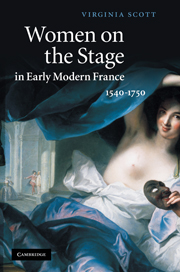Book contents
- Frontmatter
- Contents
- Acknowledgments
- Introduction
- 1 The actress and the anecdote
- 2 “So perverse was her wantonness”: antitheatricalism and the actress
- 3 In the beginning: “12 livres per year”
- 4 “Those diverting little ways”: 1630–1640
- 5 Mademoiselle L'Étoile: 1640–1700
- 6 “Embellished by art”: 1680–1720
- 7 Lives and afterlives: 1700–2010
- Bibliography
- Index
4 - “Those diverting little ways”: 1630–1640
Published online by Cambridge University Press: 03 May 2011
- Frontmatter
- Contents
- Acknowledgments
- Introduction
- 1 The actress and the anecdote
- 2 “So perverse was her wantonness”: antitheatricalism and the actress
- 3 In the beginning: “12 livres per year”
- 4 “Those diverting little ways”: 1630–1640
- 5 Mademoiselle L'Étoile: 1640–1700
- 6 “Embellished by art”: 1680–1720
- 7 Lives and afterlives: 1700–2010
- Bibliography
- Index
Summary
In the second quarter of the seventeenth century, the commercial theatre became firmly established in Paris and underwent several profound transformations, among them an explosion in the number of playwrights and plays written, a certain regularization of the profession of actor, and an increase in patronage – and efforts at control – by the monarchy in the person of the king's first minister, the cardinal de Richelieu. According to Paul Pellisson, the first historian of the Académie Française:
the passion that the Cardinal had for Dramatic Poetry raised it… to the highest point it had ever reached among the French. All those who thought they had some talent did not fail to work for the Theatre: that was the way to approach the Great and to be favored by the first minister… Not only did he attend with pleasure all the new plays, but he was also happy to confer with the Poets, to see their projects in their early stages, and even to furnish them with subjects himself.
Beyond the personal pleasure he took in attending a play, Richelieu's mission was to “rehabilitate” the theatre as part of his cultural policy; according to Georges Couton, the king gave him a free hand. Under his aegis Pierre Corneille, Jean Mairet, Jean de Rotrou, Pierre Du Ryer, and many other playwrights furnished the two established theatres with an astonishing number of new tragedies and comedies, increasingly consistent with the ideas of the cardinal and the taste of an audience newly attracted to the drama.
- Type
- Chapter
- Information
- Women on the Stage in Early Modern France1540–1750, pp. 101 - 141Publisher: Cambridge University PressPrint publication year: 2010



